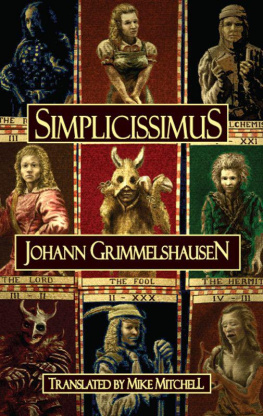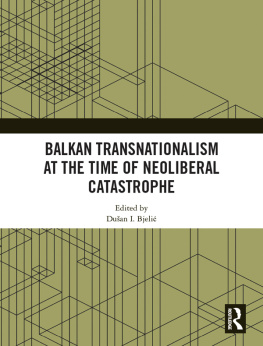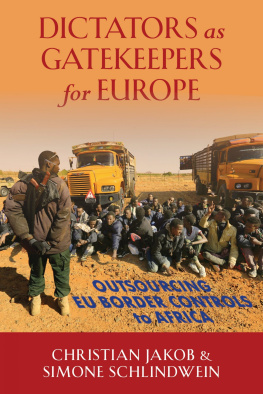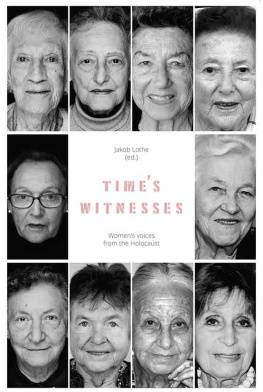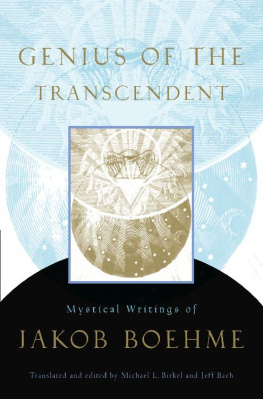Transnationalism and the Jews
Transnationalism and the Jews
Culture, History and Prophecy
Jakob Egholm Feldt
London New York
Published by Rowman & Littlefield International Ltd
Unit A, Whitacre Mews, 26-34 Stannary Street, London SE11 4AB
www.rowmaninternational.com
Rowman & Littlefield International Ltd. is an affiliate of Rowman & Littlefield
4501 Forbes Boulevard, Suite 200, Lanham, Maryland 20706, USA
With additional offices in Boulder, New York, Toronto (Canada), and Plymouth (UK)
www.rowman.com
Copyright 2016 by Jakob Egholm Feldt
All rights reserved. No part of this book may be reproduced in any form or by any electronic or mechanical means, including information storage and retrieval systems, without written permission from the publisher, except by a reviewer who may quote passages in a review.
British Library Cataloguing in Publication Data
A catalogue record for this book is available from the British Library
ISBN: HB 978-1-78348-139-2
PB 978-1-78348-140-8
Library of Congress Cataloging-in-Publication Data
Names: Feldt, Jakob, author.
Title: Transnationalism and the Jews : culture, history, and prophecy / Jakob Egholm Feldt.
Description: London; New York : Rowman & Littlefield International, Ltd., [2016] | Includes bibliographical references and index.
Identifiers: LCCN 2016026342 (print) | LCCN 2016026511 (ebook) | ISBN 9781783481392 (cloth : alk. paper) | ISBN 9781783481408 (pbk. : alk. paper) | ISBN 9781783481415 (Electronic)
Subjects: LCSH: JewsEuropeHistory19th century. | JewsEuropeHistory20th century. | JewsCultural assimilationEuropeHistory19th century. | JewsCultural assimilationEuropeHistory20th century. | JewsEuropeIdentity. | EuropeEthnic relations.
Classification: LCC DS135.E83 F45 2016 (print) | LCC DS135.E83 (ebook) | DDC 305.892/40409034dc23
LC record available at https://lccn.loc.gov/2016026342

The paper used in this publication meets the minimum requirements of American National Standard for Information SciencesPermanence of Paper for Printed Library Materials, ANSI/NISO Z39.48-1992.
Printed in the United States of America
Contents
Acknowledgements
Acknowledgements
This book is the outcome of a long and continuing interest in how we in the field of humanities identify the objects we study and how we identify the subjectivation processes that provide us with explanations, causes and effects. Few objects in the humanities have had a more ambivalent and catastrophic history than Jewishness loaded with tremendous impact on the way in which we organize history with a capital H as well as tremendous impact on millions of peoples lives.
Im very grateful that the Danish Independent Research Council for the Humanities awarded me with a grant in 2013 that made it possible to devote myself almost entirely to this project for an important period of time. The grant also enabled me to establish a small research group who has given me indispensable assistance in the process. The research group at Roskilde University consists of Michael Harbsmeier, Karin Ltzen, Morten Thing, Cecilie S. Simonsen, Maja Gildin Zuckerman, Rune Larsen and Sren Blak Hjortshj, all of whom I have very much appreciated discussing the construction of Jewishness with. I also thank Miriam Leonard, Cathy Gelbin and Sander Gilman for helpful comments on sections of this book. I have discussed these issues with many people in many places over the years.
My particular gratitude goes to my editor Martina OSullivan for her continuous support, to Maja Gildin Zuckerman for being my friend through all possible entanglements of academia and to Liv Egholm for being the most diligent and supportive reader a person could ask for. All shortcomings are entirely my own.
Dedicated to Ilan Gur-Zeev (19552012)
This book has been conceived of as an itinerary of a concept. Since the concept of transnational or transnationalism was shaped in its modern progressive meaning early in the twentieth century, it has been used mainly as part of various academic vocabularies related to international, globally oriented social science studies. Its use has radically increased since the early 1990s, as has its range within different fields. This itinerary does not track the use of the concept in academic literature but will demonstrate how the cultural and historical imagination, as well as the prophetic horizon, of transnationalism is deeply entangled with Jewish cultural and historical experience. In this way, this itinerary should be approached as a possible route in a semantic, semiotic, diagnostic and metaphorical landscape of Jewishness where we will see how transnationalism as analysis, description and vision was given its meaning. Today, this heritage seems forgotten for more than anecdotal purposes. Following the historical destinations of this book from the late Enlightenment to the First World War, we will see how what was once very specific and controversial problems for and about Jews in Europe, and for their conceptual and theoretical abstractions related to identifying the signs of Jewishness, has become a universalized experience of a globalizing world. The current uses of transnational and transnationalism indicate a deep shift in root metaphor and cultural-historical imaginary when we stage our both global past and our necessarily global future, a shift from a sedentarist and anti-Jewish imaginary to a mobile and Jewish one.
Since the early 1990s concurrently with the contemporary reinvention of transnationalism, we have seen a strong, and highly contentious, re-appropriation of Jews and Jewishness in the Western world. The lost Jewish world of Eastern Europe once destroyed in the Holocaust is being rebuilt as exhibitions, museums and tourist guides but also as food, music and theatre, while the European Union and its member states increasingly has integrated the Jews as model Europeans in official history and memory. Auschwitz is the universal evil that Europe struggles against while near-all politicians stand in line to proclaim that we support the Jews against terrorism and anti-Semitism. At the same time rages the Israeli-Palestinian conflict with strong ramifications in the West across the historical left-right axis but increasingly also among immigrant population groups. In the analysis of Islamic terrorists, there is a natural connection between attacking symbols of freedom of speech such as Charlie Hebdo and civil Jewish lives. Jewishness has become so Western that there is no real distinction to make between the West, the Israeli and the Jew. In Nietzschean terms, this is the most dangerous ressentiment of our time. This shows us that even though it might be that the diagnosis that 150 years ago indicated Jewishness now indicates the lot of all people, Jews are still or again in a precarious situation in the global culture wars. We have all become transnationals, but the complicated and ambivalent discourses of Jewishness remain. Histories are continuously rewritten vis--vis new experiences in the present and the popularity of the concept of transnational is one of many indications that what used to be Jewish experiences are becoming central global trajectories.
The itinerarys choice of important sites and destinations in the history of the entanglement of Jewishness and transnationalism has been chosen by the work and life of Horace M. Kallen (18821974), who more than anyone constructed the cultural philosophy of transnationalism, cultural pluralism. The preferred holy sites of Kallens intellectual, cultural and historical itinerary are also mine since what I seek to describe is the network of associations that eventually produced the concept of transnational. In this way, Kallen is this books central protagonist. Not all the chapters are about him and his work, but all chapters are extensions of problems that Kallen identified about the state of the modern world and the state of Jewishness. Kallen lived his entire life in and with the great historical movement that shifted the root metaphorical premises from roots to routes. The routes that Kallen in this book is an icon of, led from Eastern European small towns in the 1880s, across the Atlantic to global cities such as New York or Chicago, and finally back to Europe again. These trails have carried the most parochial of cultures, histories and identities, but these cultures, histories and identities have in recent years returned to Europe and the world as progressive theories of how different types of cultural consciousness and social organizations are more conducive for the future of the globalizing world. The routes have become the itineraries of a practical cosmopolitanism that circumvents the troubled history of Enlightenment cosmopolitanism. Transnationalism was, when Randolph Bourne coined it in 1916, thought of as a pragmatic, the best practice-oriented way of being both a local and a global citizen, an attitude that would be really constructive to confront the modern mobile world with. It is in Kallens many and varied writings that we find this attitude assembled as a historical subject.


 The paper used in this publication meets the minimum requirements of American National Standard for Information SciencesPermanence of Paper for Printed Library Materials, ANSI/NISO Z39.48-1992.
The paper used in this publication meets the minimum requirements of American National Standard for Information SciencesPermanence of Paper for Printed Library Materials, ANSI/NISO Z39.48-1992.
